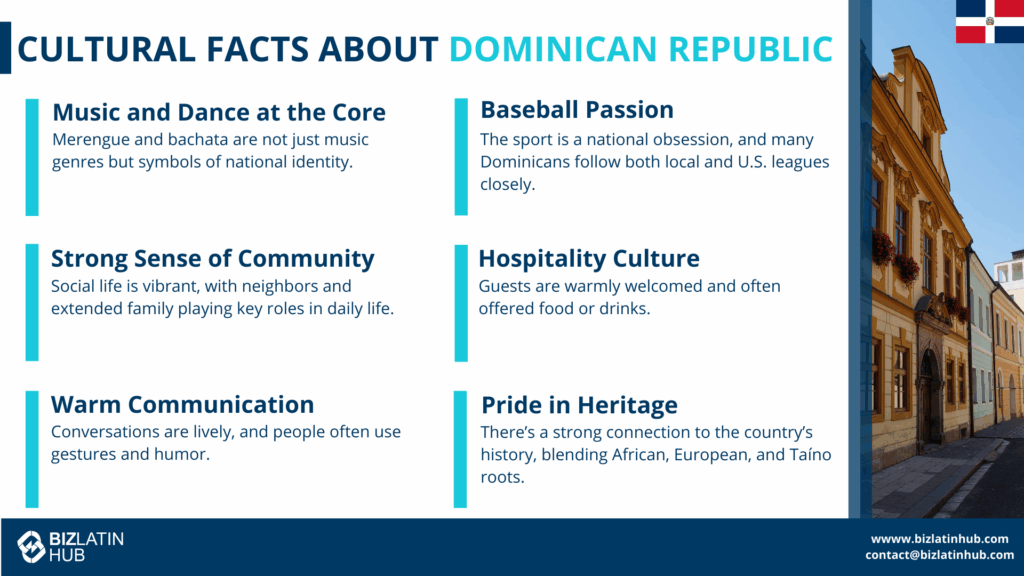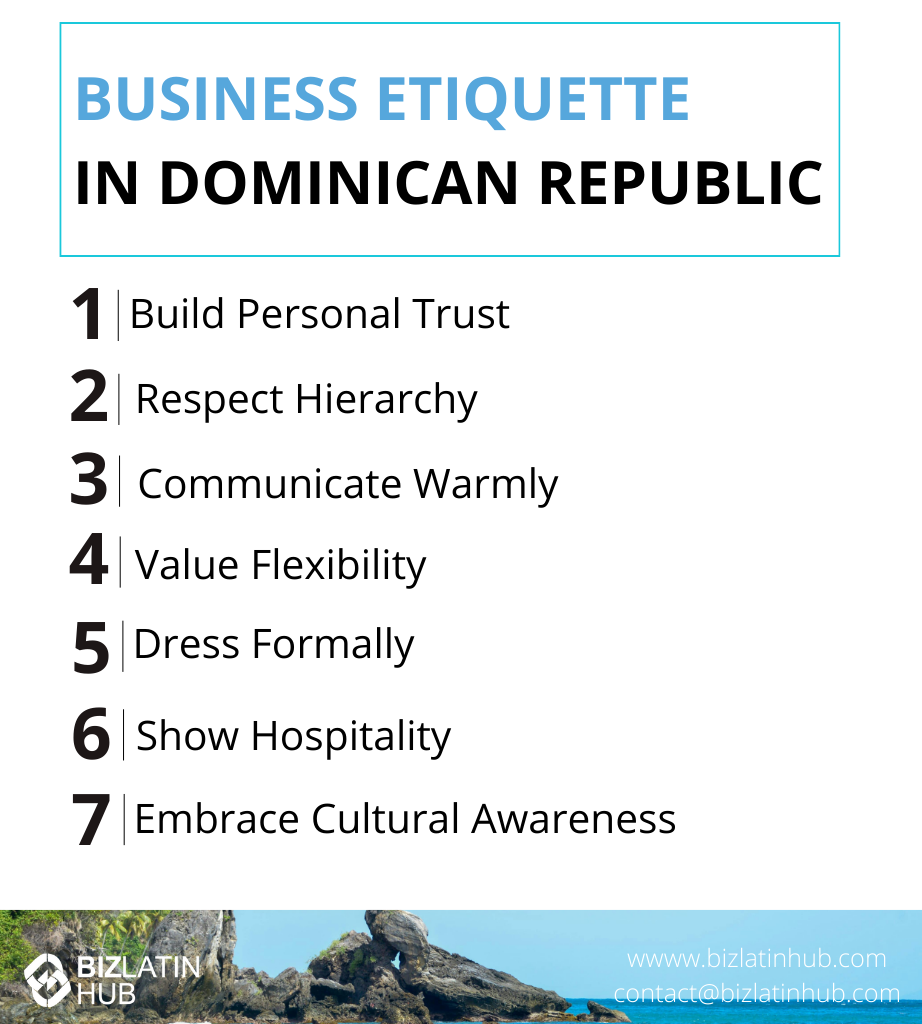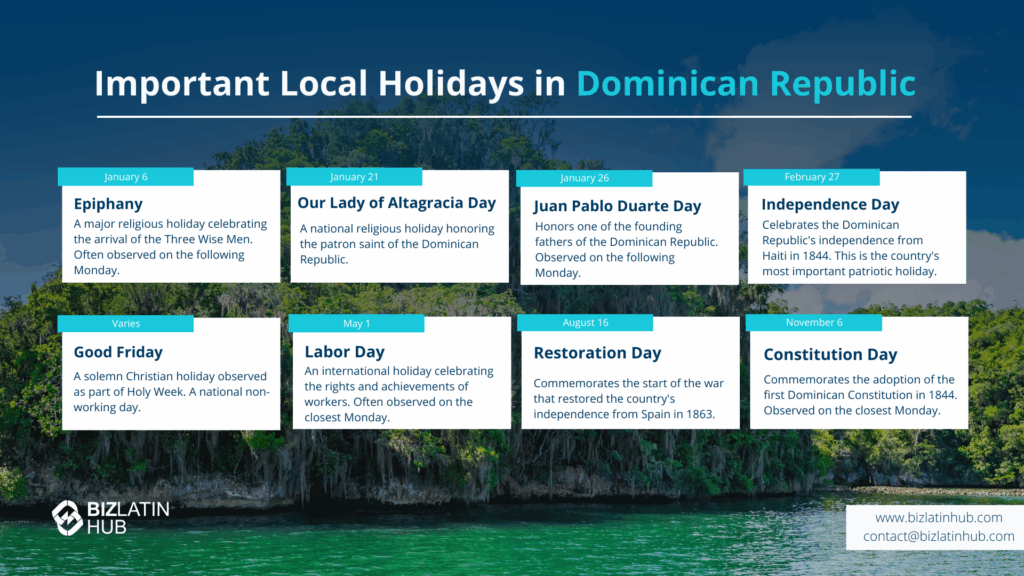Navigating through business etiquette in foreign lands can often feel like exploring uncharted waters. Dominican Republic’s mixed cultural roots offer a fascinating lens into its business culture. Grasping these essentials is crucial for those looking to succeed in this vibrant economy after company formation in the Dominican Republic.
Biz Latin Hub’s in-market experience in Santo Domingo gives us unique insight into how professionals can successfully engage with Dominican partners and clients.
Business in the Dominican Republic relies heavily on personal relationships, along with an emphasis on hierarchy and respect. A keen understanding of local communication styles and professional norms can pave the way for fruitful interactions. Gift-giving also holds specific nuances, highlighting the nation’s value on warm hospitality and respectful exchange.
This article will guide you through the intricacies of Dominican business etiquette. From understanding local customs to navigating social etiquette, we will provide essential tips. Cultivating cultural awareness will enhance your business endeavors in the Dominican Republic, turning challenges into opportunities.
Understanding Dominican Business Culture
Business in the Dominican Republic thrives on personal connections. Trust and strong relationships often hold more weight than knowledge or skills. This culture emphasizes flexibility, with meetings that can happen spontaneously. Social gatherings provide valuable opportunities to strengthen business bonds.
Professional attire is crucial. A sharp appearance shows respect for the business culture. Additionally, local customs can greatly influence negotiations. Presentation of business cards in Spanish is vital, making a good first impression in interactions.
Trust is paramount in Dominican business culture. Personal introductions and referrals go a long way toward securing partnerships. Don’t expect major commitments in a first meeting—rapport must come first.
The Importance of Personal Relationships
Building these connections is key to success. Consistent efforts, like frequent visits, help nurture these ties. Attending social events, such as dinners or baseball games, offers chances to connect personally. In this culture, personal bonds are often valued over formal credentials. Networking forms a business cornerstone. It often requires efforts like remembering birthdays or showing interest in family. These small gestures can significantly enhance relationships and open doors to fruitful business partnerships.
Hierarchy and Respect
In Dominican business, hierarchy is vital. Structures are clear and influence workplace dynamics and decisions. Respect for authority is deeply rooted, affecting interactions among employees and leaders. Using formal titles, like Señor or Señora, is customary until familiarity is established. Decision-making usually happens from the top down. Identifying key decision-makers is essential in this environment. Patience is crucial as processes can be slow, often needing multiple approvals. Understanding this hierarchy helps in effectively navigating business dealings.
Communication Styles
Face-to-face meetings are favored for their warmth and expressiveness. Communication is often lively and incorporates storytelling. This creates a festive atmosphere. Dominicans are warm and expressive. Be open and friendly, but avoid overly aggressive negotiation tactics.
Indirect methods are common, using phrases like “we’ll see” instead of a firm no. Understanding intent requires reading between the lines. Maintaining harmony guides conversations, with great care taken to avoid confrontations. This method ensures relationships remain positive. Adaptability in communication is important in understanding and engaging with Dominican business contacts.
Professional Norms and Practices
In the Dominican Republic, personal relationships are key to business success. Establishing trust through strong personal connections is essential. Initial business meetings often include small talk. This helps in building rapport before any business discussions. The style of communication is formal. Using titles and last names shows respect. Only after being invited can you switch to first names. Business cards play an important role too. One side should be translated into Spanish. Exchange them after introductions. This respects the local culture and aids understanding.
Punctuality and Flexibility
Punctuality in the Dominican Republic blends being on time with flexibility. While it’s courteous to arrive promptly at meetings, it’s common for them to start late. This reflects the cultural blend of valuing relationships and comfort. Openness to spontaneous changes is crucial. The vibrant social scene may lead to unexpected lunches or changes. Foreigners are expected to be on time despite the relaxed local attitude. Patience and calmness are necessary as delays are normal. Adapting to these nuances helps in navigating business engagements.
Formal Dress Codes
Business attire in the Dominican Republic is conservative and formal. Men are expected to wear dark-colored suits. Women should wear suits or dresses that reflect a neat appearance. Despite the tropical climate, the emphasis is on polished dressing. Fashion consciousness is valued, and maintaining a sharp appearance is important. Attire extends to various formal occasions like weddings and religious events. Elegant clothing for both men and women is required. Locals take pride in presenting themselves well, even in professional settings. Dressing appropriately helps in leaving a positive impression.
Hospitality in Business Settings
Hospitality and politeness are crucial in Dominican business settings. Interactions, especially with elders, should be respectful. Invitations to coffee, lunch, or social events are common. Accepting them aids in relationship building and shows an appreciation for local hospitality. The family is central in Dominican business culture and influences decisions. It’s vital to engage with family as part of the business fabric. Exchanging business cards with the Spanish side facing up shows cultural respect. Building personal rapport through social interactions, like dinners or leisure activities, is important for successful partnerships.
Gift-Giving Etiquette
Gift-giving holds an important place in Dominican Republic culture, enhancing personal and business relationships. While not obligatory, small thoughtful gifts—like branded notebooks or coffee from your country—are appreciated, especially during holidays and home visits.
In Dominican society, giving and receiving gifts should reflect politeness and respect. Presenting a gift is a positive gesture that aligns with the emphasis on personal connections. When selecting gifts, focus on quality rather than extravagance.
Appropriate Occasions for Gifts
In the Dominican Republic, occasions for gift-giving are special opportunities to show appreciation. While not required, bringing a gift is appreciated during holidays or home visits. These gestures enhance business relationships and reflect cultural sensitivity. Suitable gifts include local delicacies like fine Dominican rum and gourmet chocolates. Elegant desk ornaments or a well-crafted pen also make thoughtful gifts. It is crucial to avoid excessive and overly personal gifts, as they may not align with cultural norms.
Types of Gifts and Their Significance
The type of gift you give in the Dominican Republic holds significance. Gifting local delicacies like fine Dominican rum or gourmet chocolates is appreciated. These gifts reflect the rich culture of the Dominican Republic and showcase thoughtfulness. When invited to a Dominican’s home, chocolates or pastries are well-received. These simple gestures demonstrate appreciation and respect. Conversely, avoid gifts in black or purple, as these colors symbolize mourning. Opt for gifts that reflect elegance and cultural taste.
How to Offer and Accept Gifts
The practice of offering and accepting gifts in the Dominican Republic is built on respect and thoughtfulness. When you visit someone’s home, chocolates or pastries make an appropriate gift. These small gestures convey goodwill and appreciation. Avoid gifts in colors linked to mourning, such as black or purple. Instead, focus on thoughtful choices like local delicacies, which are well-regarded. Extravagant gifts or those of a personal nature may be inappropriate. Instead, choose items that reflect cultural norms and show tasteful intent.

In the Dominican Republic, social etiquette focuses on personal connections and respect. People value interactions that show politeness and warmth. Communication here is often lively and expressive. Dominicans use gestures and facial expressions to enhance their points during a conversation.
Proximity during discussions is typical, with close-standing showing interest and trust. Eye contact is equally important. Use formal titles like ‘Licenciado’ or ‘Ingeniero’ when addressing professionals. A handshake is typical for first meetings. A single cheek kiss between men and women may follow in future interactions.
Dressing conservatively but well signifies respect, both in personal and social settings. Networking extends beyond business, incorporating family gatherings and social events. Building personal relationships remains a core aspect of interactions.
Tipping Practices in Various Settings
Tipping in the Dominican Republic reflects service appreciation across different situations. Tour guides often receive a 10% tip for tours, whether private or multi-day. Restaurants expect a similar 10% for good service, which is standard. Taxi rides offer modest tips; short trips may see 0.50 pesos tips, whereas extended journeys might merit 7.50 pesos. Business meals and social gatherings add another layer, with a customary 10% tip on top of any included service charge. Tipping customs draw influence from other cultures, notably the United States, and tipping for services like hotel shuttles is common.
Dining Etiquette
Dining in the Dominican Republic is a rich cultural experience. Shared meals create bonds and encourage animated conversations. Table manners here reflect the nation’s heritage. Tipping in restaurants ranges from 10-15%, varying by occasion and location. Waitstaff commonly share tips with kitchen staff, with higher tips for services considered appropriate. Bars and cafes appreciate small tips with each order, often by rounding up the bill. For crafted cocktails or skilled services, larger tips are customary. This practice shows respect and gratitude to service workers.
Social Events and Networking
Dominican social events often serve as the starting point for business discussions. Networking is crucial in the business landscape. Personal connections here play a vital role and often spill beyond office settings into social activities. Communication during these events is warm and expressive, with storytelling and animated chats common. Dominicans place importance on respecting hierarchy. Acknowledging senior figures is essential in networking functions. These gatherings blend personal and professional life, whereby relationships are strengthened amid vibrant social settings. Respect and expressiveness guide interactions in the Dominican Republic.
Respecting Local Customs and Values
Understanding local customs and values is key to successful business in the Dominican Republic. Respect for elders plays a crucial role in Dominican culture. Standing when older individuals enter a room is a common practice. Personal relationships form the foundation for trust and successful partnerships in the business landscape. Familiarity with cultural nuances aids in effective communication and negotiation, making it easier to adapt to workplace dynamics. Dominican greetings emphasize warmth through hugs or handshakes, showing the importance of personal connections. By respecting these customs, you can navigate the Dominican business environment more effectively.
Understanding Social Structures
Social structures in the Dominican Republic are deeply influenced by Roman Catholic traditions. Strong personal relationships are vital for building trust and forming business alliances. Patience is necessary in navigating the decision-making process. Respecting seniority also aids in smoother negotiations. Being polite and maintaining strong personal connections is highly valued. Developing rapport with key influencers and their assistants can lead to better communication with executive decision-makers. This understanding of social norms contributes to establishing successful partnerships.
Adapting to Cultural Norms
Adapting to cultural norms in the Dominican Republic requires attention to professional behavior. Business cards are common during introductions, with one side often translated into Spanish. Building personal relationships is essential for trust and business success. Business attire shows respect for the local business culture. Openness to spontaneous schedule changes is necessary. This includes being flexible with unplanned lunches or extended chats. Respecting these cultural norms is crucial for long-term successful business partnerships in the Dominican Republic. Adapting to local practices can help avoid misunderstandings and foster productive relationships.
Challenges and Opportunities for Foreign Businesses

Foreign businesses in the Dominican Republic encounter both challenges and opportunities. One major challenge is navigating bureaucratic processes. These hurdles can slow down operations. Continuous infrastructure development is essential for supporting economic growth. The country’s strategic position offers valuable opportunities. Investors can use the Dominican Republic as a base to export goods and services to a larger regional market. The tourism and hospitality sector presents significant growth potential due to its pristine beaches and vibrant culture. The Dominican economy is thriving, with a well-established service culture. This has made it an attractive destination for various international businesses. Success in the Dominican Republic hinges on respecting local customs and cultural dynamics. Adapting to these factors is crucial for foreign businesses aiming to thrive in this environment.
Building Trust with Local Partners
Building trust with local partners is vital in the Dominican business landscape. Trust forms the core of business culture here. Personal connections often outweigh knowledge or skills in transactions. Networking is crucial for business success. It involves social gatherings and regular communication. This investment of time helps foster strong personal relationships. Nepotism is common in workplaces. Familial relationships and trust-based networks influence business decisions. Understanding local customs and cultural nuances can prevent misunderstandings. This helps build and maintain trust with Dominican partners. Respect for these aspects ensures smoother business operations. In the Dominican Republic, relationship-building is not just advantageous—it’s imperative.
Negotiating Successfully in Dominican Context
Negotiating in the Dominican Republic requires patience. Dominicans favor a more personal approach. Building trust and rapport is essential before any major business dealings. Relationships often begin slowly, as Dominicans prefer to do business with those they know or who are referred to them. Acceptance in the business setting can take time, especially for newcomers. Skilled bargaining is a key trait among Dominicans, making it important to avoid high-pressure tactics. Instead, focus on establishing a connection before negotiating terms. Being patient and respectful can lead to successful business negotiations in the Dominican context. Such an approach paves the way for long-term business relationships with a local flair.
Enhancing Business Success Through Cultural Awareness
Understanding local culture and business etiquette in the Dominican Republic is crucial for success. Building personal relationships is key. Casual chats over coffee or lunch support these connections. Recognizing Dominican cultural cues is important. Combining tradition with innovation helps forge strong business connections.
Here are some tips for business success:
- Build Trust: Spend time getting to know your business partners.
- Social Interactions: Engage in casual conversations during meetings and meals.
- Respect Traditions: Acknowledge and appreciate both traditional and modern practices.
- Adapt Customs: Be mindful of cultural nuances in both social and professional environments.
- Cultural Awareness: Understand cultural differences to prevent misunderstandings.
Emphasizing cultural awareness can enhance business relationships. This approach is vital in the diverse and vibrant culture of the Dominican Republic. Understanding these aspects leads to productive business results. Remember, adapting to local customs can pave the way for success in this dynamic business landscape.

Frequently Asked Questions
Are business relationships personal in the Dominican Republic?
Absolutely. Establishing personal connections and mutual respect is critical to success. Business often starts only after trust has been built.
How should you communicate professionally in the Dominican Republic?
Professional communication in the Dominican Republic is typically formal and expressive. Use titles like Señor or Señora, and address people by their last names until invited otherwise. Face-to-face meetings are preferred, and small talk is essential before moving into business discussions. Indirect language and storytelling are common to preserve harmony.
What should I wear for a meeting in the Dominican Republic?
Dress formally in business settings. Men should wear suits and ties; women should choose professional, modest attire. Lighter fabrics are recommended due to the tropical climate.
How important is punctuality in Dominican business culture?
While punctuality is appreciated, meetings in the Dominican Republic often start late. Foreign professionals should arrive on time but remain flexible and patient, as the culture values comfort and relationship-building over strict schedules.
Is it appropriate to bring a gift to a Dominican business meeting?
Yes, especially during holidays or if invited to someone’s office. Small, thoughtful gifts are a nice gesture but not required.
How should foreigners approach negotiations in the Dominican Republic?
Negotiations should begin with relationship-building. Dominicans prefer to work with people they trust or who are referred. Be patient and avoid aggressive tactics. Establishing rapport and respecting hierarchy leads to more successful and lasting agreements.
How important are titles and hierarchy?
Titles such as ‘Doctor’, ‘Ingeniero’, or ‘Licenciado’ carry weight and should be used in formal communication.






